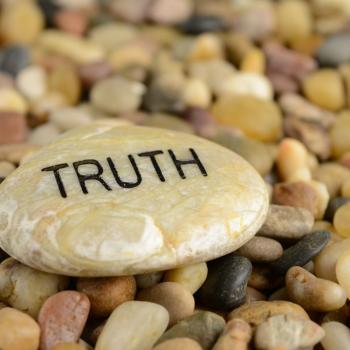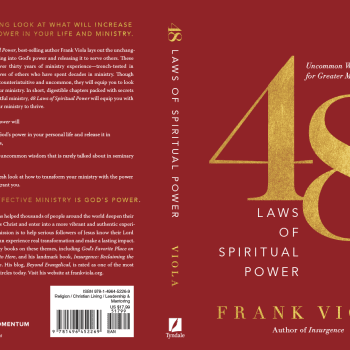It was with fascination that I read the title of Deacon Greg Kandra's August 20th post "When is a 'Catholic' wedding not really Catholic?" And what did I learn? When I perform those weddings, I am Deacon Kandra's infamous "Chaplain Bill."
Deacon Kandra's post was in response to an alert he reportedly received about my wedding ministry. He informs his readers that instead of a ministry, I'm running a sham operation called "Progressive Catholics & Interfaith Weddings." I'm a fraud, or to use his phrase, "sort-of-maybe-not-quite [a] priest bedecked in a Roman collar."
He implies that I cajole those who cannot or do not want to be married in the Roman Catholic Church into letting me marry them. He alerts readers that while weddings that I witness are "legally valid, they aren't sacramental"—not a true "Catholic" marriage. "Buyer beware," he cautions, warning that those who think otherwise "are being duped."
Wow, am I glad it's not the Middle Ages! I can envision torch-bearing villagers, led by a burly cleric, whisking me away to be burnt at the stake. But before you scurry away, rosary-in-hand, chanting "Anathema sit," you might want to hear—in the immortal words of Paul Harvey—"the rest of the story."
I am a validly ordained Catholic priest in the independent Catholic tradition, formerly with the American National Catholic Church and now with the United American Catholic Church, another of the independent Catholic communion of churches. Regardless, Deacon Kandra's position is clear: the only valid Catholicism is Roman Catholicism; progressive or independent Catholicism is "schismatic."
The problem here is that the deacon's construct is faulty. His starting point is that all things authentically "Catholic" must be "Roman Catholic." Yet the "Roman" part of "Roman Catholic" is an adjective, not Catholicism's first name. There are many other types of Catholics, some associated with cultural groups such as Coptic Orthodox Catholics, Byzantine Catholics, or Polish National Catholics; others, such as Old Catholics, span all cultures.
Moreover, Deacon Kandra implies that progressive or independent Catholicism is a recent fad; however, history proves otherwise. We trace our roots as far back as the 1600s, beginning with the autonomy granted the Ancient See of Utrecht, Holland, solidified by a break from the Roman Church at Vatican I over papal infallibility.
As a priest in the independent Catholic tradition, my wedding ministry is open to all. Often, one of the couple is a former Roman Catholic who left the Church for a variety of reasons yet is looking for a faith-filled wedding ceremony. Scores have left because they disagree with the institutional church's official teachings, are troubled by an unrelenting worldwide sex abuse scandal, or have experienced rejection by the Church. According to a recent Pew Research Center study, "[A]pproximately one-third of those who say they were raised Catholic no longer describe themselves as Catholic."
These are the individuals who come to me to be married. They clearly understand that I am very much Catholic, just not Roman Catholic. For them, this is an attraction, not a hindrance. These are serious folks who aren't looking for an end-run around the Roman Church but a welcoming and joyful sacramental experience of God's love at this wonderful time of new beginnings. For many, their wedding becomes an opportunity for another conversation as they take a new look at faith. I am honored to witness their marriages and to celebrate God's all-embracing love in their lives.
Many would hold that we are witnessing nothing less than a worldwide exodus from the Roman Church, punctuated—in the U.S.—by the recent convictions of the Archdiocese of Philadelphia's Vicar of Clergy and the Bishop of Kansas City-St. Joseph Mo., both for child endangerment, as well as the frontal assault on American Nuns (LCWR), a Republican veneer on U.S. Roman Catholicism, and so many other issues. No wonder many find the Roman Church wanting.
Instead of engaging with others on these and other issues, the Roman Church has become more intransigent and doctrinal. So many conversations with the institutional Church—Deacon Kandra's response included—are about how high the wall, how locked the gate. As I remind my graduate students, "If the only tool in your toolkit is a hammer, everything must be a nail." On so many fronts, the Roman Church approaches complex issues with the delicacy of a hammer. What is needed is an open and listening heart.
In what has become a dying-declaration interview, former Roman Catholic archbishop of Milan, Cardinal Carlo Maria Martini, said that the Church was "200 years out of date." He added, "Our culture has aged, our churches are big and empty and the church bureaucracy rises up, our rituals and our cassocks are pompous. The Church must admit its mistakes and begin a radical change, starting from the pope and the bishops. The paedophilia scandals oblige us to take a journey of transformation."
For us in the universal Catholic tradition who are called to minister to the people of God, whether deacon, priest, bishop, or pope, let us remember the true purpose of our ordination. We are called not to judge but to serve, nor to pomposity but to humility, the humility of a God who became one of us.
So I pray most fervently for the Catholic Church universal. I pray for Deacon Kandra's ministry; I pray for my own. There is so much to do. Let's get on with it, shall we?
Editor's Note: Rev. Freeman, having taken offense at Deacon Greg Kandra's blog piece, was invited to respond here.
12/2/2022 9:05:38 PM




